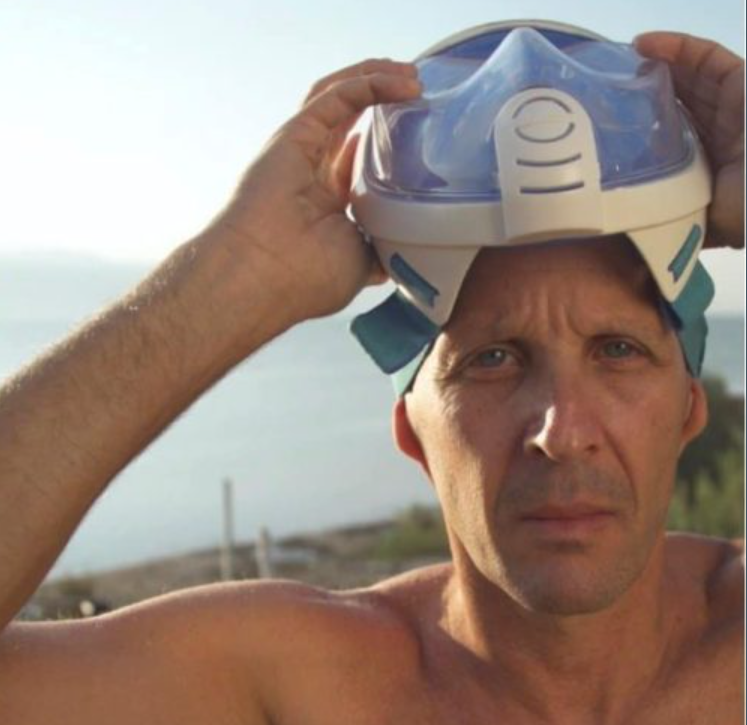Most people who come to the Dead Sea are content to wade in, float for a few minutes, and move on. Oded Rahav chose a different path. He swam across it — a 7.5-hour endurance test from Jordan to Israel that set a Guinness World Record and was later described by the Olympic Committee as one of the most complex open-water swims ever attempted.
The feat wasn’t about athletic glory. For Rahav, it was a way to spotlight a crisis: the Sea of Salt, or Yam HaMelach, is shrinking at a pace that threatens its future.
Rahav spoke with Rabbi Rami Goldberg on Biblical Money, the podcast produced by Israel365. The episode stood out from most interviews because Rahav isn’t an overseas guest; he’s based in Israel and is fighting to save one of the Holy Land’s most iconic places. Israel365, which connects Christians and Jews in support of Israel, sees work like Rahav’s as part of a broader mission: protecting the land that carries the Bible’s story.
A Career Built Around Water
Rahav has spent more than 30 years in water-related businesses — irrigation, desalination, and agriculture — industries where Israel is a global leader. He also launched two unconventional startups, one that preserved endangered languages through audiobooks and another that digitized music delivery to radio stations years before streaming existed.
His experience convinced him that technology can reverse environmental decline. “If Israel hadn’t invested in desalination 30 years ago, we wouldn’t exist,” Rahav said. Today more than 70 percent of Israel’s drinking water is desalinated, and some of it is already being returned to the Sea of Galilee to revive the Jordan River. The same tools, he argues, can save the Dead Sea.
Swimming as a Call to Action
Rahav has a record of using endurance swims to raise awareness. In the past, he’s swam from Cyprus to Israel to highlight marine plastic pollution and from San Diego to Mexico in support of refugees. The Dead Sea swim was part of that pattern — a dramatic way to force attention onto an overlooked crisis.
Few realize how serious the situation is. The Dead Sea’s water level drops by more than a meter a year. Sinkholes have swallowed roads. Resorts have closed. The once-mighty Jordan River has dwindled to a fraction of its flow. “Every three days the water falls another centimeter,” Rahav said. “That’s the clock.”
Land, History and Responsibility
What makes the Sea of Salt worth saving isn’t just its salinity or its shrinking shoreline. The region is packed with history and meaning. It’s where the Dead Sea Scrolls were found. It’s near where Jesus was baptized. The Israelites crossed the Jordan close by. For both Jews and Christians, the area is a living connection to scripture.
Its environment is also unique. High oxygen levels, mineral-rich mud, and filtered sunlight have made it a destination for health treatments for decades. Rahav believes it could become a “global healing center” — but only if it survives.
The Dead Sea Guardians
In 2020 Rahav founded the Dead Sea Guardians, a nonprofit pressing Israel, Jordan and the Palestinians to restore water flow to the Jordan River and adopt modern solutions like desalination and renewable energy. “We’re not doing anyone a favor,” he said. “We’re helping nature recover — and creating jobs, tourism and stability in the process.”
He also wants to change how people talk about the area. “I don’t use the term ‘Dead Sea’ anymore,” Rahav explained. “It’s Yam HaMelach, the Sea of Salt. It’s alive, and it can be saved.”
The organization’s goal is to recruit one million “guardians” worldwide — not only donors but people who spread the message and push governments to act.
A Billion-Star Hotel
Rahav is serious about his mission but keeps a sense of humor. When a potential donor asked about luxury accommodations at the Dead Sea, he replied, “We don’t have a five-star hotel. We have a billion-star hotel — the desert sky. I’ll build you a tent and put a fire in the middle. That’s the real experience.”
For Rahav, time is short. “Every three days the water drops. There is only now,” he told Rabbi Goldberg. “If we wait, it will be too late.”





